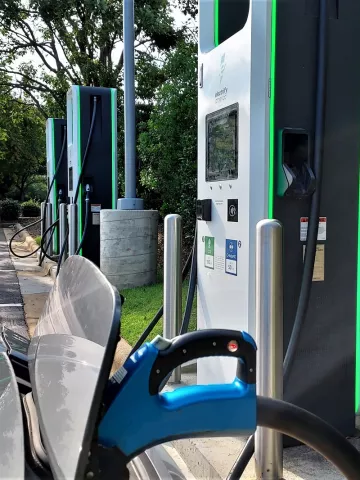We've talked a lot about the environmental benefits North Carolina can reap from "greening" our roads and the vehicles that use them. There's another way we can profit - literally - as we continue our path toward becoming the "Green Roads State:" by training our people for good-paying, steady jobs in the burgeoning fields of electric vehicle manufacturing and EV infrastructure.
North Carolina has committed to electrifying its transportation sector and reducing greenhouse gas emissions, thanks to targets set out in executive orders from Gov. Roy Cooper. Current goals include reaching 1.25 million light duty electric vehicles (EVs) by 2030, and for zero-emission vehicles (ZEVs) to account for half of all new vehicle sales in the state by the same year. North Carolina also has a mandate to reduce greenhouse gas (GHG) emissions by 70 percent from 2005 levels by 2030, and reach net zero emissions by 2050.

Last month, the N.C. Sierra Club and some of our allies in clean transportation advocacy released a report about North Carolina’s EV charging infrastructure and the many benefits our state can reap from a clean transportation transition. Our state government is also working on its Clean Transportation Plan, which will include deploying $109 million in federal funding for EV charging.
To develop strong, reliable clean transportation infrastructure, North Carolina has one inescapable requirement: an abundance of workers trained in this field. And the state is planning now to make sure training is available to build that workforce.
The N.C. Department of Transportation (NCDOT) recently developed an Electric Vehicle Infrastructure Deployment Plan to outline how it plans to use the $109 million in funds from the National Electric Vehicle Infrastructure (NEVI) Formula Program, a component of the federal Bipartisan Infrastructure Law.
NCDOT's plan will include partnerships with other state agencies, such as the state Department of Commerce, to focus on economic development and workforce training opportunities. NCDOT also has internal units that currently facilitate workforce development and on-the-job training, and will begin to lead workforce-related initiatives under NEVI.
NCDOT plans for a collaborative approach to developing an EV workforce, with stakeholders that include the N.C. Works Commission (the state’s workforce development board), local workforce development boards, the N.C. Chamber of Commerce, and the state’s community college system.
This in-state collaboration will help assure that proper, uniform standards are set for EV installation. Training standards can be guided with help from the Electric Vehicle infrastructure Training Program, a non-profit industry group that helps electricians grow their EV-specific skills.
NCDOT's Deployment Plan also recommends coordination among groups to provide low-cost and/or targeted EV training for disadvantaged and underrepresented groups.The department's Office of Civil Rights will lead NEVI program elements for business development, on-the-job and other training with a particular focus on Diversity, Equity, Inclusion, and Accessibility.
North Carolina Agricultural and Technical State University will take a leading role, using a $23.7 million grant from the American Rescue Plan Good Jobs Challenge to create STEPs4GROWTH, an equity-focused clean energy workforce program. STEPs4GROWTH will deploy mobile training units in 16 economically distressed counties, and more than 40 businesses in the state have committed to hiring program graduates.
North Carolina's robust community college system already has recognized opportunities for its students in renewable energy-related fields. A few years back, the N.C. Community College System released a Code Green Super CIP, which sought to redesign curriculums focused around green building, energy, engineering, environment, and transportation technologies.
Now, the system is pivoting to emphasize courses that will support degree and non-degree training related to EVs and EV infrastructure. Its 2022-2026 Strategic Plan calls for partnering with the state Commerce Department to ensure that community colleges stay aligned with emerging employment trends, including the EV sector.
And with more EV manufacturing jobs expected in the next several years - at Vietnamese EV-maker VinFast's planned factory and Toyota's planned EV battery production facility - some community colleges have committed funds to train workers specifically for those jobs.
Our state is about to explode with clean transportation projects and, while we'll all reap the environmental benefits, our working people have a great opportunity to train for and win jobs in a flourishing new business sector.
That's how clean energy development will help North Carolina's environment and all who live in it, now and long into the future!